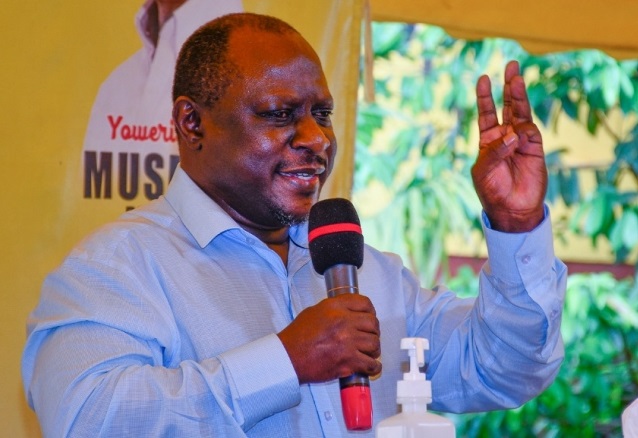By David Kenneth Mafabi
Over the last few weeks, we have stressed yet again that political and technical leaders who disparage the need for ideological self clarification, shall wittingly or otherwise unnecessarily complicate our struggle for all-round national transformation. We have contributed to that discussion by briefly outlining the contours of: the Contemporary National Question; and the Nature and Character of the State.
Last week in particular, we established that “the state is a machine for maintaining the rule of one class over another. When there were no classes in society … a special group of people whose function is to rule and to dominate the rest of society, had not and could not yet have emerged. Only when the first form of the division of society into classes appeared, only when slavery appeared, when a certain class of people, by concentrating on the crudest forms of agricultural labour, could produce a certain surplus, when this surplus was not absolutely essential for the most wretched existence of the slave and passed into the hands of the slaveowner, when in this way the existence of this class of slave-owners was secure … then in order that it might take firm root it was necessary for a state to appear. (V.I. Lenin, 1919).
The Slave-owning State was followed in history by the Feudalist State. In the great majority of countries slavery in the course of its development evolved into serfdom. The fundamental division of society was now into feudal lords and peasant serfs … As far as the peasant serf was concerned, class oppression and dependence remained, but it was not considered that the feudal lord owned the peasants as chattels, but that he was only entitled to their labour, to the obligatory performance of certain services.
With the development of trade, the appearance of the world market and the development of money circulation, a new class arose within feudal society – the capitalist class. During the eighteenth century, or rather, from the end of the eighteenth century and during the nineteenth century, bourgeois capitalist revolutions took place all over the world. Feudalism was abolished in all the countries of Western Europe, and the Capitalist State was born.
At the start of the 20th Century yet another form of state – the Socialist State – appeared in Russia. But, as the 20th Century unfolded, practical and theoretical challenges emerged for the revolutionaries leading the struggles against Colonialism and Neo-Colonialism. The material and other conditions did not exist in most of the colonized countries for Capitalist or Socialist Revolutions. While it was clear that the struggle was against colonialism and for national independence, what was to be built on the ashes of defeated Colonialism?
The leader of the Chinese Revolution, Mao Zedong, offered some critical insights in his January 1940 work, “On New Democracy”: “…it is perfectly clear that whoever can lead the people in overthrowing imperialism and the forces of feudalism can win the people’s confidence, because these two, and especially imperialism, are the mortal enemies of the people. Today, whoever can lead the people in driving out imperialism and introducing democratic government will be the saviours of the people.
Therefore, the peasantry, the intelligentsia and the other sections of the petty bourgeoisie undoubtedly constitute the basic forces determining fate. These classes, some already awakened and others in the process of awakening, will necessarily become the basic components of the state and governmental structure. The democratic republic which we desire to establish now must be a democratic republic under the joint dictatorship of all anti-imperialist and anti-feudal people.”
This new democratic republic will be different from the old European-American form of capitalist republic under bourgeois dictatorship, which is the old democratic form and already out of date. On the other hand, it will also be different from the socialist republic of the Soviet type under the dictatorship of the proletariat which is already flourishing in the U.S.S.R …
However, for a certain historical period, this is not suitable for the revolutions in the colonial and semi-colonial countries. During this period, therefore, a third form of state must be adopted in the revolutions of all colonial and semi-colonial countries, namely, the new democratic republic. This form suits a certain historical period and is therefore transitional; nevertheless, it is a form which is necessary and cannot be dispensed with.
Thus, the numerous types of state systems in the world can be reduced to three basic kinds according to the class character of their political power: (1) republics under bourgeois dictatorship; (2) republics under the dictatorship of the proletariat; and (3) republics under the joint dictatorship of several revolutionary classes.”
The first kind comprises the old democratic states, The second kind exists in the Soviet Union, The third kind is the transitional form of state to be adopted in the revolutions of the colonial and semi-colonial countries. Each of these revolutions will necessarily have specific characteristics of its own, but these will be minor variations on a general theme.
So long as they are revolutions in colonial or semi-colonial countries, their state and governmental structure will of necessity be basically the same, i.e., a new-democratic state under the joint dictatorship of several anti-imperialist classes.” (Mao Zedong, 1940).
Yoweri Museveni summarized the essence of the New Democratic State very simply: “The NRM is neither pro-West nor pro-East – it’s pro-Uganda.”
The New Democratic State led by the National Liberation Movement has a number of objective and historical national tasks – in politics, economics and spiritual life of society – to discharge. “Objective” here means the tasks are designed by reality and necessity – not by our individual wishes or desires. The tasks are of the nuclear, space and digital age. There is no picnic or casual affair here. Next week we shall outline some of these – as we discuss the “Challenge of Take-Off”.
The writer is Senior Presidential Advisor/Political Affairs (Special Duties), State House ([email protected])
Do you have a story or an opinion to share? Email us on: [email protected] Or join the Daily Express WhatsApp channel for all the latest news and trends or join the Telegram Channel for the latest updates.


